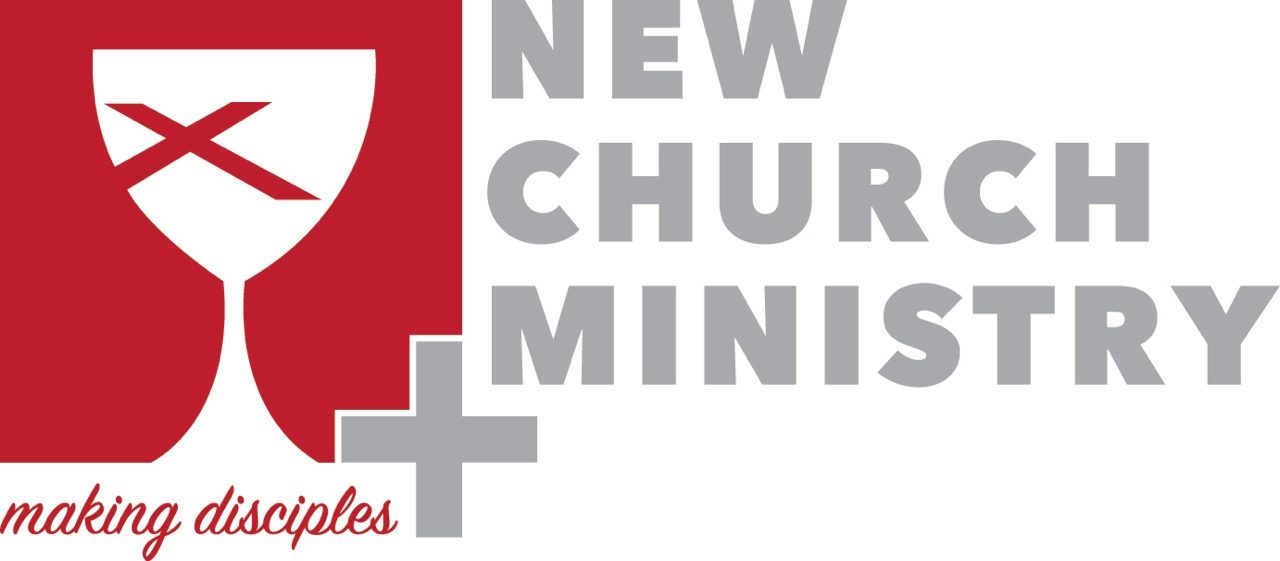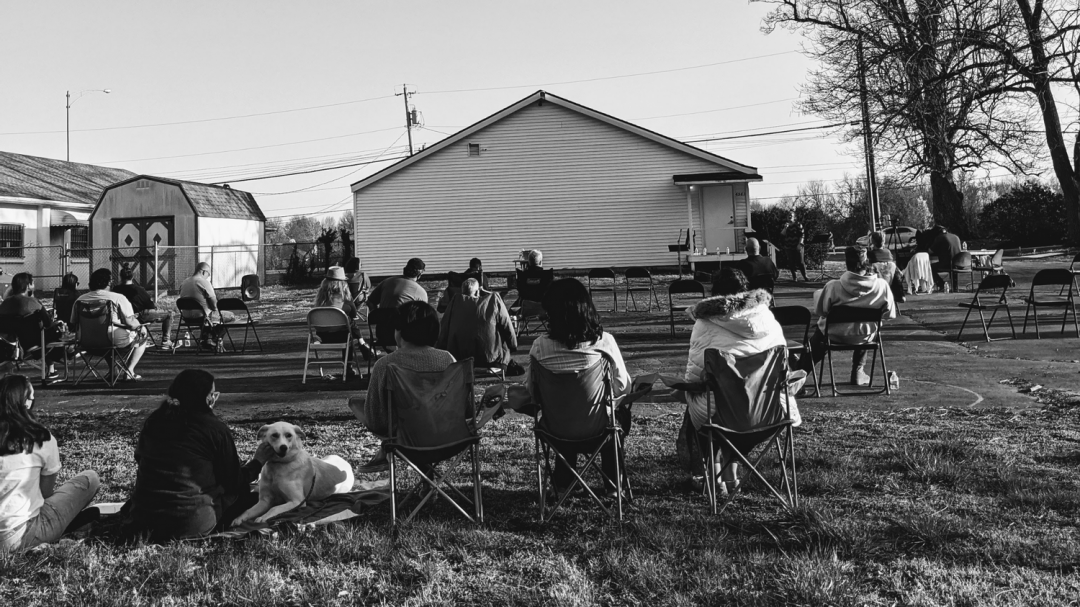The Connecting Grounds (TCG) has always been a Disciples congregation, it just didn’t know it.

That’s what Christie Love’s good friend, a Disciples of Christ pastor, told her when she called in the middle of June 2020. TCG’s landlord had just informed the new Springfield, MO, congregation that it must move or end its ministry doing outreach for unhoused people.
TCG provided food, clothing, and public restrooms from the strip mall location they rented. But as the Covid-19 pandemic began, the ministry to 200-plus people moved to the sidewalk in front for safety.
“My team didn’t feel like the church — the whole church— could shelter in place,” during the heightened need created by the pandemic, recalls Christie. “Yes, there were safety issues. But the call of the gospel doesn’t have a caveat for health conditions.”
When shoppers objected to “those people” being so near their grocery store, Christie called her Disciples pastor friend in frustration. As he listened, Rev. Phil Snider recognized in this independent, interdenominational worshiping community qualities that matched the Disciples ethos. He knew that the Christian Church (Disciples of Christ) in the United States and Canada could support his friend’s community of faith. (Through the annual Pentecost Offering, Disciples Mission Fund supports local new church development as well as New Church Ministry (NCM), which trains, equips, assists, and multiplies emerging places of worship and their leaders.) Would TCG consider joining the denomination?
An Increasing Discomfort with Church
Christie had launched TCG nearly two years earlier out of profound discomfort with what she saw as inappropriate coziness between American faith communities and middle-class values.
“A lot of people living at or below the poverty line don’t feel welcome in American churches,” Christie says. She heard from lower-income people an awkwardness and even “shame in their inability to afford participation.”
So, Christie and her team had researched socio-economic trends within the local church context. They learned that financial status did factor heavily in membership. When they explored the lives of those who were not included in church, they found their ministry calling. Those facing decreased income, housing instability, or with their children in foster care, often had experienced significant trauma that had created those conditions. Further, many others had felt the sting of exclusion from communities of faith.
“We asked, ‘How do we create a church space that isn’t classist, that is open, especially cost-wise? How do we create one that is trauma-informed? How do we be aware of the imprint that the church has on people who’ve been the victims of weaponized and misused religion?’ These questions helped to shape our identity,” remembers Christie.
TCG’s planters had also noticed another trend: wealthier, progressive congregations on the south side of town had planted smaller congregations on the north side, focused on addiction recovery and re-entry after prison.
“It’s all good work, but there wasn’t an entry point for people that didn’t have preexisting issues,” says Christie. “It seemed like people who struggled with drugs, alcohol, or an addictive behavior were sent to (those churches). It didn’t feel like a space existed for people who were trying to understand who Jesus was.”
Building Church Around Community Need
In a neighborhood with a poverty rate of 30 percent (twice the state’s average), TCG launched a no-barrier food pantry and a clothing closet designed for low-income and unsheltered people. TCG didn’t require IDs or proof of address for participation, making access easier for visitors.
They also started Family Connection, a program developed in partnership with the county’s Children’s Division to provide space for children in foster care to visit their biological families.
“A big part of our heart from day one was to wrap around and support the reunification efforts of separated families,” Christie says, “and to do that in a loving and trauma-informed space.”
When the landlord called to challenge their operation in her building, Christie knew the congregation was not going to abandon the call they felt to welcome people unconditionally. She called Rev. Phil to pray with her. He prayed. But he also introduced her to Disciples who could help.
New Partners

Christie learned the Disciples of Christ Mid-America region owned an empty property in her community, so she met with Regional Minister Rev. Ron Routledge, who then connected her with former Regional Minister Rev. Christine Chenoweth. In her meetings with Rev. Christine, Christie discovered not just help for the faith community, but for herself as well.
“She pastorally cared for me as a faith leader in ways that I’ve never experienced,” says Christie. “So often pastors love on people. There aren’t a lot of people loving back. She recognized we were going through a traumatic situation – grieving the loss of our location. She connected us to the wider church (including NCM) and introduced us to Disciples pastors in the area.”
In short order, TCG became affiliated with the Christian Church (Disciples of Christ) and accepted an early termination of its lease. Then it relocated to a small house and empty church building the region provided.

The house became the Family Connection center, providing a homelike environment for parents visiting their children in foster care. Interior walls were removed to open the floor plan, a kitchenette and a dining room table were added, and family-friendly board games were brought in.
Not Navigating Alone
But the new location presents its own challenges. The facility can shelter only 15 individuals each night in the church building – a far cry from the hundreds it used to house and shelter. Furthermore, the new location is on a very busy state road without any sidewalks. Even public transportation proves problematic, as there is a lack of bus stops nearby.


However, as they navigate these new challenges, the people of TCG aren’t doing so on their own. NCM and local DoC churches have stepped up.
Through Leadership Academy, which is the ministry’s annual educational opportunity for pastors and core teams of both established and newly planted churches, Christie has been able to share her knowledge about trauma-informed ministry. Through relationships with local pastors, she has found peer support.
Today, Christie and her team plan to create phase one of a US $12 million transitional supportive shelter called Roots of Community, which will provide affordable housing through an apartment complex with a community and daycare center on-site. Already, they have petitioned the city council for American Rescue Plan Act (ARPA) funds and started fund-raising efforts.
The TCG team also bought a small respite house this year to support people receiving chemotherapy or hospice care, as there are few places in Springfield for them to go to.
“As we’re building relationships with people, we’re including them in community, and making them feel welcome,” says Christie.
With NCM and other Disciples partners sharing the load, TCG will continue to look for innovative ways to fill gaps the church has historically missed in Springfield. For Christie, an evolving ministry is what innovative theology is all about.
“We never say, ‘Okay, we accomplished this,’ because love, justice, and mercy are the things that we’re called to, there’s always going to be a call to something deeper and higher.”
You Can Help
Gifts made to the Pentecost Offering support New Church Ministry and innovative new church development, like The Connecting Grounds. This Special Day Offering will be received in most congregations on May 29 and June 5. For additional information and resources that you can share with church members, visit pentecost-offering.com

